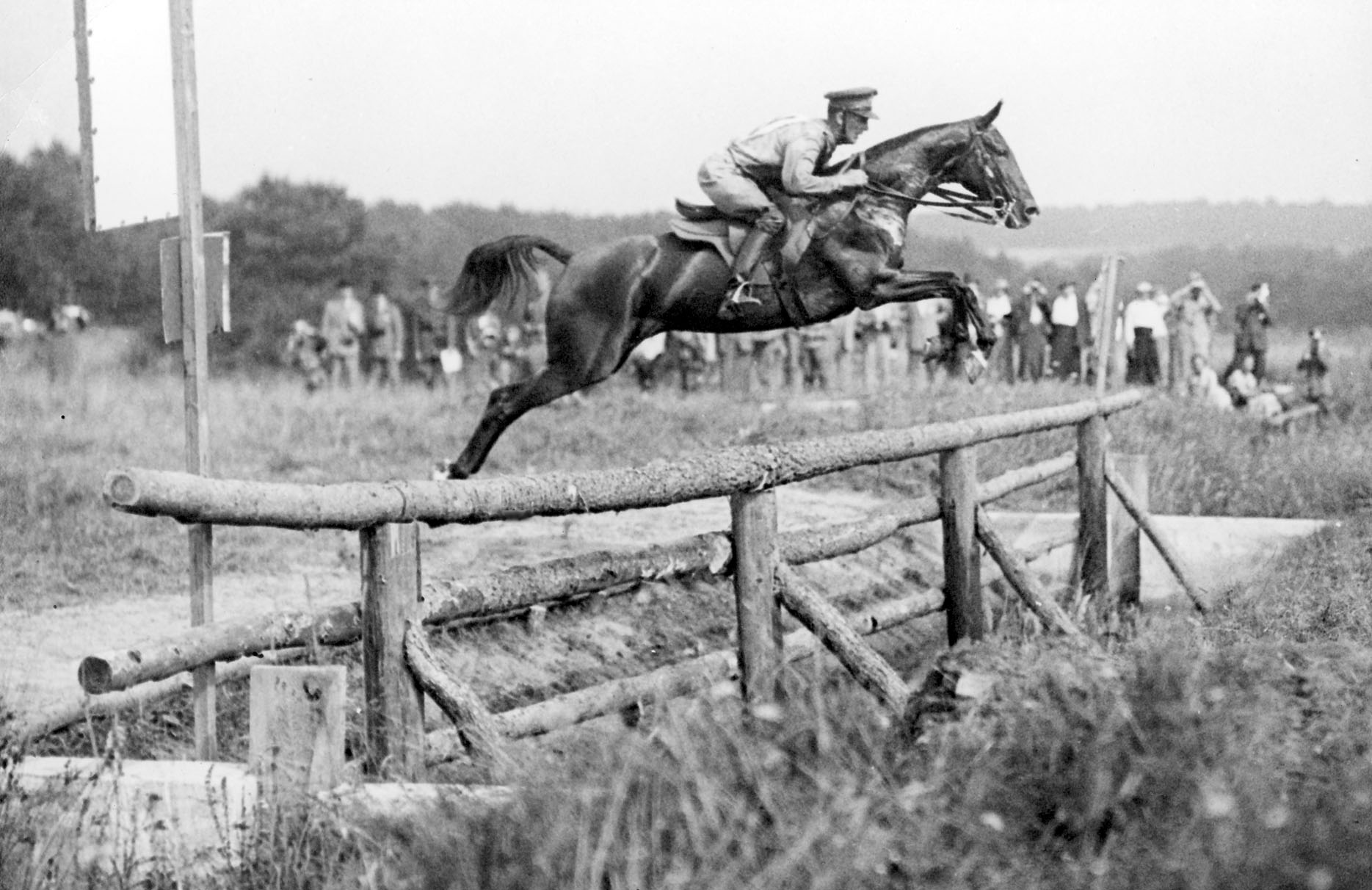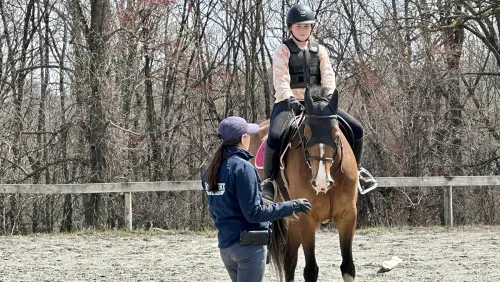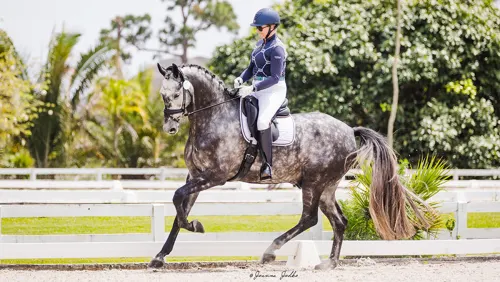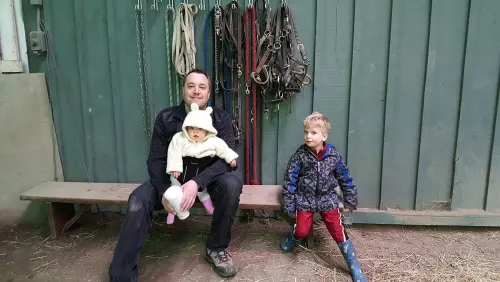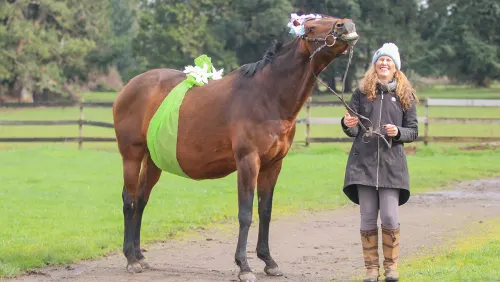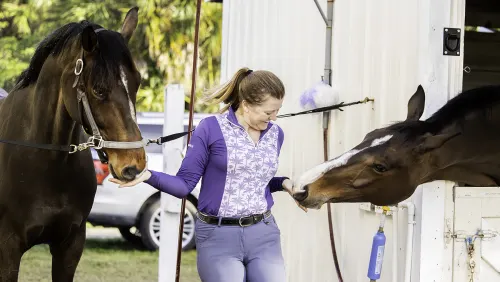A star was born in 1926. But she didn’t know that one day she’d be regarded as one of the greatest event horses of all time. Back then Jenny Camp was merely concerned with frolicking about in the lush, green fields of the U.S. Army Remount Station in Front Royal, Va.
Jenny’s birth was the result of a change to the U.S. Army’s breeding programs in the 1920s when the Army Remount Service was introduced. A structured, scientific approach to cavalry horse breeding, as well as the establishment of the Advanced Equitation School at Fort Riley, helped to significantly raise the quality of stock and riders. It was this school that became the testing ground for Olympic hopefuls, and nearly all the riders who competed in the Olympic Games for the United States in the 1920s and 1930s came from the program.
Jenny had a lot going for her at the very beginning despite her relatively small size (under 15.3) and less than ideal conformation, as her father was the fabulous Gordon Russell. Gordon Russell was one of the most valuable breeding stallions the U.S. Army ever owned, siring Jenny and the Olympic show jumper Democrat, which cemented the United States as a serious contender in Olympic show jumping and eventing. While Jenny’s dam remains a mystery, she was thought to be Thoroughbred-Standardbred, and undoubtedly her sire’s Thoroughbred breeding played a heavy role in Jenny’s athletic prowess.
When Jenny arrived at the Equitation School, she was partnered with Col. Earl F. “Tommy” Thomson. Together, they took home the individual silver medal at the 1932 Los Angeles Olympic Games, as well as the team gold medal. The bay mare’s performance at the 1932 Games was just the beginning of her storied career.
Four years later, the Olympics arrived in Berlin, Germany. The 1936 games proved to be controversial and, some believed, rigged to benefit the German athletes.
ADVERTISEMENT
Jenny Camp had a later starting time on cross-country, which proved to be an advantage, as the course was demolishing the field, literally. Fence 4 on the course, a seemingly straightforward water combination, was proving to be a dasher of dreams for the majority of the competitors. The fence consisted of a 3-foot jump into the pond, then a jump out, but the water was over 3 feet deep and extremely muddy on the bottom, which caused many horses to fall.
While 48 horses started cross-country that year, only 15 managed to get through the water successfully, and only three of the 18 teams were able to field a full squad for show jumping. Jenny Camp was the last to go for the U.S. squad, whose medal hopes were dashed when Slippery Slim, ridden by Capt. John Williams, broke his leg in the water jump and had to be euthanized. The other U.S. combination, Capt. Carl A. “Rags” Raguse and Trailolka, also parted ways at the water jump but managed to finish the course.
By the time Jenny and Thomson headed toward the start box, word had gotten back that fence 4’s short route was causing many problems, so Thomson chose to take the longer, left-handed route and blazed around the course. They also jumped clean in show jumping to take home their second individual silver medal.
“When one considers the challenges of travel and training one would encounter in the period that this mare competed, her accomplishments were outstanding,” said Denis Glaccum in the Chronicle of the Horse’s Millenium Issue (Dec. 24, 1999). “This mare was able to handle the infamous Berlin Olympics.”
Since the 1940 and 1944 Olympic Games were canceled due to World War II, Jenny Camp and Thomson never got a chance to try for a third medal. However, Jenny remains a legendary mare thanks to her Olympic record, one that was only bested by Charisma (Mark Todd, 1984 and 1988) and Marcroix (Lt. Charles F. Pahud de Mortanges, 1928 and 1932), who each won two consecutive Olympic gold medals.
ADVERTISEMENT
“She had tremendous heart and a willingness to do her job,” said Maj. Gen. Jonathan R. Burton.
Jenny Camp retired from competition after the 1936 Games and lived out the remainder of her life as a broodmare. However, her legacy lived on in the 1960s, when the introductory division at horse trials was named the Jenny Camp division. Today, the Jenny Camp Horse Trials, hosted by the Maryland Combined Training Association, is held every September.
One of web writer Coree Reuter’s favorite parts of working at The Chronicle of the Horse is adventuring up into the attic. While it’s occasionally a journey that requires a head lamp, GPS unit and dust mask, nearly 75 years of the equine industry is documented in the old issues and photographs that live above the offices, and Coree is determined to unearth the great stories of the past. Inspired by the saying: “History was written on the back of a horse,” she hopes to demystify the legends, find new ones and honor the horses who have changed the scope of everyday life with this blog.
Curious about anything in particular? Have a question or an interesting topic? Please e-mail Coree, she’d love to hear from you!

